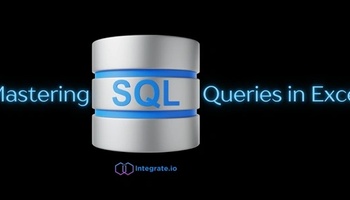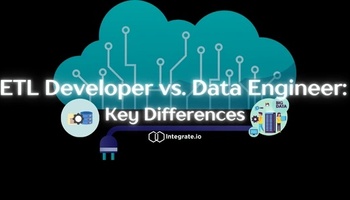Our three key points are:
- Business intelligence is a combination of the insights provided by certain processes and best practices to help an organization make better decisions.
- Answering these questions and tracking progress toward goals requires the ability to gather, optimize, and analyze data on a user-friendly analytics platform, and use the findings to create an action plan.
- A business intelligence, or BI, tool is an app, software program, or other analytics solution that supports the automation of the collection and processing of vast amounts of raw data from systems throughout the business, helps teams find specific datasets to query, and assists in data preparation so teams can create reports from query responses.
How well do you really know your Ecommerce business? If you have no way of accessing your store’s real-time big data, you can’t see a snapshot of your business at any point in time. Without a business intelligence software platform or BI tools, you’re missing out on real-time benefits.
What Is Business Intelligence (BI)?
Business intelligence is a combination of the insights provided by specific processes and practices that help businesses make better decisions. Some of these steps include:
- Data mining. Helps highlight trends evident in large sets of data.
- Data prep. Collecting data from multiple sources, identifying it, and preparing it for analysis.
- Queries. Asking questions about the datasets, business intelligence tools find the answers.
- Descriptive analysis. Using the preliminary findings to create an image of the business.
- Statistical analysis. Using the findings from the previous step to explore the datasets for specific trends and reasons why a certain trend is occurring.
- Visualizing the data. Creating visual representations of the data for easier consumption, such as charts or graphs.
- Visual analytics. Explores the visual data, and turns it into stories that communicate insights.
- Reports. Sharing the results of the previous steps with key stakeholders, from which those stakeholders can draw their own conclusions for decision-making.
- Create benchmarks and set KPIs. Lets key stakeholders compare current data with historical data. Tracks current metrics against forecasts, goals and visible trends to predict future outcomes.
Having a comprehensive view of your data and using it to bring about real change eliminates inefficient aspects of your business or industry and lets you make changes on the fly in response to supply and demand or market fluctuations. Today’s business intelligence tools allow business owners and teams to analyze and govern their own data.
History of Business Intelligence
The first known mention of “business intelligence” was in a business encyclopedia written by Richard Devens in 1865. Devens used the term to define how a banker arrived at his decisions to stay ahead of his competitors. The technology was further developed throughout the 1930s and ‘40s, but it wasn’t until the ‘60s, when the DSS, or decision support system, was developed, that business intelligence began to take on the form we currently know today. The actual term "business intelligence" wouldn’t again be used until 1989, when Howard Dresner — who would go on to become an analyst for Gartner — proposed it as a term to encompass all business activities with the aim of making better, more guided decisions. But it wouldn’t be until more than 130 years after its first known mention that business intelligence would become the widely recognized means of uncovering data and using it to the advantage of businesses that we know today.
Integrate.io is a new ETL platform with a blazing fast change data capture (CDC) for deep Ecommerce capability. Send us an email, and one of our ETL experts will answer your questions and show you how Integrate.io can help you reach true business intelligence.
How Does Business Intelligence Work?
All businesses, both Ecommerce, and in-store have goals to meet and questions that need answers. Answering these questions and tracking progress toward goals requires the ability to gather and analyze data, and use the findings to create an action plan.
Technically, the business’s tools, apps, and other solutions collect raw data. This data gets processed and then stored. Data storage can be:
- A data warehouse
- The cloud
- Other apps
- Data files
After the business’s data is stored, users access it and begin analyzing it for the answers to the business’s questions.
A business intelligence tool offers visual solutions so raw data can be converted into charts, graphs, or other representations for presentation to primary stakeholders.
But what exactly is a business intelligence tool, or BI solution?
What Are Business Intelligence Tools?
To arrive at usable business intelligence, data management should be a top priority for an Ecommerce business. But managing data first requires a means of collecting and processing it. A business intelligence, or BI, tool is an app or software program that collects and processes vast amounts of raw data from systems throughout the business, both internally and externally. BI solutions help teams find specific datasets to query. A BI tool also assists in data preparation so teams can create reports from query responses. Reporting capabilities help:
- Improve business decisions
- Increase efficiency
- Identify new sales potential and revenue opportunities
- Identify trends
- Identify and report on actual key performance metrics (KPIs)
While BI tools are normally used just for straightforward queries and reports, these solutions can also analyze data in an ad hoc manner, as well as offer:
- Reporting at enterprise scale
- Online analytical processing, or OLAP
- Mobile business intelligence analysis
- Real-time business intelligence data
So, business intelligence tools can do all of this and more — so what specifically should you look for in a business intelligence tool for Ecommerce?
What to Look for in a Business Intelligence Tool
The most important aspect to keep in mind when looking for the right BI tool for your business is the outcome. What do you need or want to discover? To choose the right BI tool, the most helpful primary features you should look for include:
- Ease of use
- Type and quantity of options for dashboard appearance and visualizations
- Insights offered
- Ability to set alerts for both meeting and missing KPIs
- Artificial intelligence (AI)
- Flexibility of setup
- Ability to easily integrate with your other apps and tools
Not sure about integration capability? Check out our Integrations page to see all the programs Integrate.io currently works with. Don’t see an integration? Send us an email — we can build custom integrations for your Ecommerce business.
We’ve covered what a business intelligence tool is and what you should look for to find the best one for your Ecommerce business. But why do Ecommerce businesses especially need BI tools?
Why Ecommerce Businesses Need BI Tools
It's tough to identify an industry or type of business that wouldn’t benefit from business intelligence tools — but BI tools are specially designed for Ecommerce businesses. You likely have multiple apps and tools you use already, but are those programs “talking” to each other? Is your website connected with your inventory management software? Is your inventory management connected to your order fulfillment program? One of the key benefits of BI tools for Ecommerce businesses is that it can collect the data from all of your tools and sales channels — regardless of whether those tools are currently connected — opening a wide-angle lens into your business, its customers, and all activity in real-time.
BI tools are able to sort massive sets of raw and unstructured data, process it, and return real, actionable insights for decision-makers. And the process isn’t slow — you can continuously grab the data you need from any source (such as your customer relationship management [CRM] program), measure your target KPIs, and analyze data across departments to find such information as who your most loyal customers are, which of your customers will likely become loyal customers, and uncover the keys in those relationships that can help you nurture them while fostering new bonds with new customers.
You can uncover trends that can help you capitalize on new money-making strategies. Plus, it helps your employees out tremendously and cuts down on productivity-sapping activities, which boosts overall employee morale.
Constant, real-time information helps your marketing department determine strategies that work, and ones that don’t, and hone messages going forward. Overall, business intelligence tools are the smartest way to improve your Ecommerce business’s profitability
Now you know what to look for in a BI tool for Ecommerce and why Ecommerce businesses need business intelligence tools, so which BI solution is right for you?
Top 4 Best Business Intelligence Tools for Ecommerce
Finding the right BI software for your Ecommerce business might sound difficult. You need to know what to look for, such as varied pricing or data analytics levels. But if you’re not sure of the many tools available, the sheer volume of BI tools on the market today could be a bit overwhelming. These are our top four options (in no particular order) for Ecommerce business intelligence tools to help you narrow your search. We’ve left off such names as Tableau, Sisense, and Microsoft to show you other platforms available and mostly geared toward Ecommerce businesses.
Domo
It doesn't matter if you have experience with interactive business intelligence tools — Domo is a heavy-hitter without all the heavy lifting. Domo has over a thousand prebuilt connectors that can collect and help you analyze data from various sources, platforms, systems, files, or other tools. Use Integrate.io to transform, normalize, and visualize your data with our Domo integration. Domo prepares the information you need to get insights into better business decisions. You can share updates and alerts with team members, as well as reports with key stakeholders. Domo is especially useful for large Ecommerce businesses that have various departments. Imagine negating the need for cross-departmental meetings because everyone can access the data they need anytime necessary.
Domo even has its own ETL feature, which lets you drag data from any tool and drop it in, turning it into whatever type of report you need. For instance, you can take data from Salesforce and drop it into an already existing Excel spreadsheet. Domo has a build-your-own-app functionality too.
But perhaps the most important reason why Domo made our list of top business intelligence tools is its functionality for Ecommerce businesses — you get crystal-clear visibility into your whole operation, from customer information to inventory levels ... the entire supply chain. Domo’s predictive analytics can help point out season-specific trends or supply chain information predicated on current and future predicted weather patterns, in effect streamlining your entire operation.
Chartio
Chartio ... it’s in the name, right? This BI tool’s claim to fame is its interactive and vibrant data visualization dashboards. Tracking and analyzing data happens in near real-time. This tool is a little more difficult to use than others on this list, though. For instance, compared to Domo’s drag-and-drop functionality, Chartio’s is rudimentary at best — more like a design feature than actual functionality. But Chartio users can collate data from today’s most popular tools and solutions regardless of location. Users then build queries in a SQL-like language (using directives such as AND or ANY), and Chartio creates an interactive dashboard to visualize the data returned.
Chartio is overall pretty accessible, especially for users who have at least a basic knowledge of SQL. For those with a better understanding of SQL, Chartio can build innovative dashboards for deeper data investigation, metrics tracking, and democratization of data. Chartio’s suite of exclusive Ecommerce tools, such as Outbrain and DoubleClick, solidifies this BI tool on our list.
Looker
Looker is a lot like the two previous BI solutions but with a marked difference — it can work within an already-existing database, supporting some of today’s most popular database management tools, such as Amazon Redshift or PostgreSQL, just to name a couple. This offers data in the form of real-time reports through a Looker-generated dashboard. The whole process is based in-browser and requires no software.
Similar to Chartio users needing to know a bit of SQL for advanced functionality, users who know SQL shouldn’t have a problem learning Looker’s native language, LookML. LookML lets any user create SQL queries without SQL knowledge. Looker’s search function works a lot like the search bar in Google.
Looker is perfect for Ecommerce businesses and non-technical users, thanks to its blocks and app modules. These modules are pre-built functions (meaning no special language knowledge necessary) to run specific tasks. No building anything from scratch if you don’t want to. Plus, many of Looker’s functions were built specifically for Ecommerce businesses. Looker has a Brand module, Category Affinity module, and more. These two modules highlight the relationships between specific brands and the type of product customers are most interested in, in real-time. You can use this data to cross-sell or upsell and boost revenues throughout the year.
Periscope Data
Periscope Data’s BI solution is an analytics tool perfect for today’s Ecommerce stores. You can connect data from various sources, analyze the data with Periscope’s built-in tools, and design visualizations (such as charts, plots, maps, etc.) for the entire team. Periscope doesn’t take long to implement and, in most cases, can be used the same day.
One of the best aspects of Periscope Data is the ability to collate data from unrelated sources in different coding languages, unite that data, and review it in the language of your choice, such as Python or SQL. So, there’s no need for everyone on your team to know multiple languages — each employee or manager can run reports in the language they know and still share them with team members. Plus, you can choose from a variety of access levels for people throughout your organization.
See Your Ecommerce Data in Real-Time with Integrate.io
Integrate.io is a new ETL platform with reverse ETL (ELT) functionality and lightning-fast CDC, offering deep Ecommerce capabilities. Schedule an intro call to learn how we can help you not only reach your data with a business intelligence platform but use your data to better reach your Ecommerce customers.










